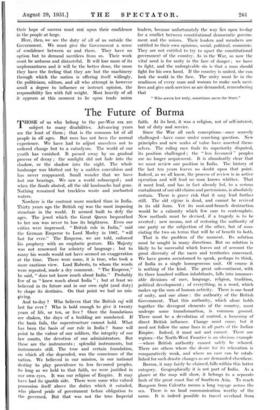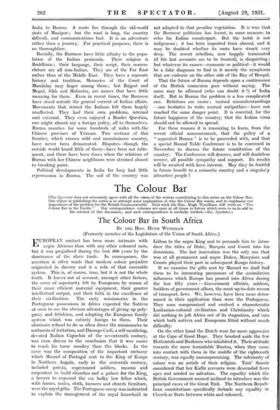The Future of Burma
THOSE of us who belong to the pre-War era are subject to many disabilities. Advancing years are the least of them ; that is the common lot of all people in all ages. But ours has not been the normal experience. We have had to adjust ourselves not to ordered change but to a cataclysm. The world of our youth has vanished. It passed away by no gradual process of decay ; the sunlight did not fade into the shadow, or the shadow into the night. The whole landscape was blotted out by a sudden convulsion and has never reappeared. Small wonder that we have lost our bearings. We saw a world submerged ; and when the floods abated, all the old landmarks had gone. Nothing remained but trackless waste and ,uncharted waters.
Nowhere is the contrast more marked than in India. Thirty years ago the British raj was the most imposing structure in the world. It seemed built to defy the ages. The jewel which the Great Queen bequeathed to her son was never to lose its brightness. Even our critics were impressed. "British rule in India," said the German Emperor to Lord Morley in 1907, "will last for ever." The Emperor, we are told, enforced his prophecy with an emphatic gesture. His Majesty was not renowned for sobriety of language ; but to many his words would not have seemed an exaggeration at the time. There were some, it is true, who took a more cautious view. Lord Roberts, to whom the words were repeated, made a dry comment. "The Emperor," he said, "does not know much about India." Probably few of us "knew much about India " ; but at least we believed in its future and in our, own right (and duty) to shape its destinies. On that point we had no mis- giving.
And to-day ? Who believes that the British raj will last for ever ? Who is bold enough to give it twenty years of life, or ten, or five ? Once the foundations are shaken, the days of a building are numbered. If the basis fails, the superstructure cannot hold. What has been the basis of our rule in India ? Some will point to the valour of our soldiers, the integrity of our law courts, the devotion of our administrators. But these are the instruments ; splendid instruments, but instruments still. The true and certain foundation, on which all else depended, was the conscience of the nation. We believed in our mission, in our national destiny to play providence to less favoured peoples. So long as we held to that faith, we were justified in our own eyes. It was our religion of Empire. It may have had its ignoble side. There were some who valued possession itself above the duties which it entailed, who placed pride of government before obligation to the governed. But that was not the true Imperial faith. At its best, it was a religion, not of self-interest, but of duty and service.
Since the War all such conceptions—once scarcely challenged—have come under searching question. New principles and new scales of value have asserted them- selves. The ruling race finds its superiority disputed, its position challenged ; the "less favoured" peoples are no longer acquiescent. It is abundantly clear that we must review our position in India. The history of the last ten years leaves no doubt upon that point. Indeed, as we all know, the process of review is in active operation and will lead no man knows whither. That it must lead, and has in fact already led, to a serious curtailment of our old claims and pretensions, is absolutely certain. There is grave risk that it may lead further still. The old regime is dead, and cannot be revived in its old form. Yet its root-and-branch destruction would be a calamity which few care to contemplate. New methods must be devised, if a tragedy is to be averted ; new means, not of restoring the authority of one party or the subjection of the other, but of asso- ciating the two on terms that will be of benefit to both.
That is the problem of the moment. Its solution must be sought in many directions. But no solution is likely to be successful which leaves out of account the great diversity of the races and territories concerned. We have grown accustomed to speak, perhaps to think, of India as a single homogeneous unit. Of course it is nothing of the kind. The great sub-continent, with its three hundred million inhabitants, falls into innumer- able divisions of • race, language, religion, tradition, political development ; of everything, in a word, which makes up the sum of human activity. There is one bond of unity, and one alone : the authority of the British Government. That this authority, which alone holds together the divergent elements of the country, must undergo some transformation, is common ground. There must be a devolution of control, a loosening of direct British influence. Change must conic, but it need not follow the same lines in all parts of the Indian Empire. Indeed, it must not and cannot. There are regions—the North-West Frontier is an obvious example —where British authority cannot safely be relaxed. There are others where the desire for its relaxation is comparatively weak, and where no ease can be estab- lished for such drastic changes as are demanded elsewhere.
Burma, it may fairly be claimed, falls within this latter category. Geographically it is not part of India. As a glance at the map will show, it belongs to a separate limb of the great coast line of Southern Asia. To reach Rangoon from Calcutta means a long voyage across the sea. There is no land communication worthy of the name. It is indeed possible to travel overland from India to Burma. A route lies through the old-world state of Manipur ; but the road is long, the country difficult, and communications bad. It is an adventure rather than a journey. For practical purposes, there is no thoroughfare.
Racially, the Burmese have little affinity to the popu- lation of the Indian peninsula. Their religion is Buddhism ; their language, their script, their nomen- clature are all non-Indian. They are of the Far East rather than of the Middle East. They have a separate history and tradition. Memories of the Court of Mandalay may linger among them ; but Rajput and Mogul, Sikh and Mahratta, are names that have little meaning for them. Even in recent times, the Burmese have stood outside the general current of Indian affairs. Movements that stirred the Indians left them largely unaffected. They had their own problems, internal and external. They even enjoyed a Border Question, one might almost say a foreign policy, all to themselves. Burma marches for some hundreds of miles with the Chinese province of Yunnan. Two sections of this frontier, which crosses wild and mountainous country, • have never been demarcated. Disputes—though the outside world heard little of them—have been not infre- quent, and there have been times when the relations of Burma with her Chinese neighbours were strained almost to breaking point.
Political developments in India for long had little repercussion in Burma. The soil of the country was not adapted to that peculiar vegetation. It is true that the Burmese politician has learnt, in some measure, to echo his Indian counterpart. But the habit is not indigenous ; it has been imported from abroad, and it may be doubted whether its roots have struck very deep. The recent rebellion, now happily terminated (if the last accounts are to be trusted), is disquieting ; but whatever its causes—economic or political—it would be a false diagnosis to find in it merely the symptoms that are endemic on the other side of the Bay of Bengal.
That the future of Burma depends upon a continuance of the British connexion goes without saying. The same may be affirmed (who can doubt it ?) of India itself. But in Burma the problem is a less complicated one. Relations are easier ; mutual misunderstandings —one hesitates to write mutual antipathies—have not reached the same danger point. It is essential, for the future happiness of the country, that the Indian virus should not be allowed to spread.
For these reasons it is reassuring to learn, from the recent official announcement, that the policy of a "separated Burma" is to be proceeded with, and that a special Round Table Conference is to be convened in November to discuss the future constitution of the country. The Conference will deserve, and will doubtless receive, all possible sympathy and support. Its results will be awaited with keen interest. May they be fruitful in future benefit to a romantic country and a singularly attractive people !



























 Previous page
Previous page